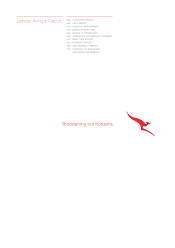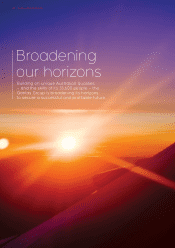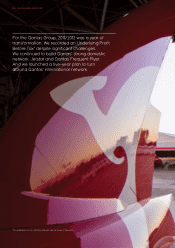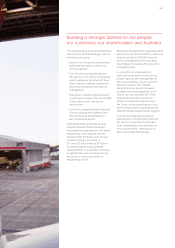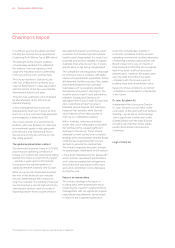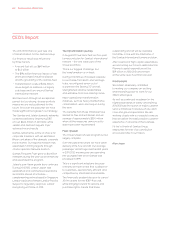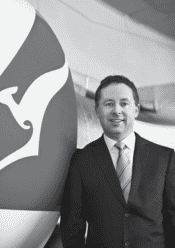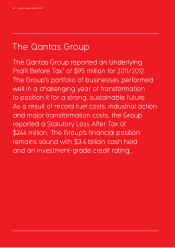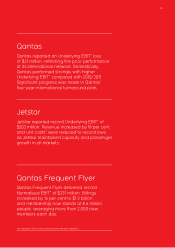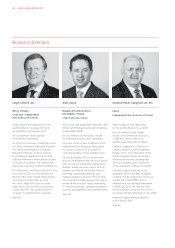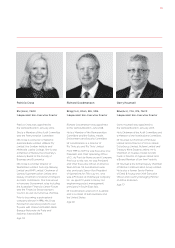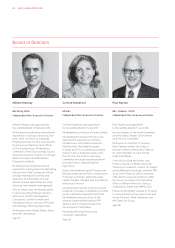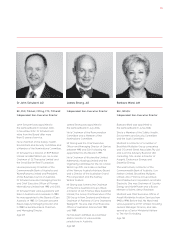Qantas 2012 Annual Report Download - page 8
Download and view the complete annual report
Please find page 8 of the 2012 Qantas annual report below. You can navigate through the pages in the report by either clicking on the pages listed below, or by using the keyword search tool below to find specific information within the annual report.
Chairman’s Report
In a difficult year for the global aviation
industry the Qantas Group reported an
Underlying Profit Before Tax of $95 million*.
The strength of the Group’s portfolio
of businesses enabled it to withstand
the material financial impacts of fuel
costs and industrial action culminating
in the grounding of the Qantas fleet.
The Group reported a Statutory Loss
After Tax of $244 million, primarily as a
result of $376 million in costs associated
with the launch of the five-year Qantas
International turnaround plan.
This plan was outlined to and endorsed
by shareholders at the 2011 Annual
General Meeting.
A new management structure has
subsequently been put in place so that
each of our four core business segments
is managed by a dedicated CEO.
The Group remains in a solid financial
position, with over $3 billion in cash and
an investment-grade credit rating with
both Moody’s and Standard & Poor’s.
We are one of only two airlines to hold
this rating position.
The global and Australian context
The dominant economic trend in 2011/2012
was the poor operating conditions in
Europe. For aviation, the crisis meant falling
demand for travel to and from the region
– already a weak spot for the Qantas
Group given the rapid expansion of
capacity between Australia and Europe.
While jet fuel prices moderated towards
the end of the financial year, nobody
should underestimate their impact on
long-haul carriers. The Qantas Group’s jet
fuel bill reached a record high and many
international airlines cited fuel costs in
reporting weaker financial performance.
Set against European economies, Asian
economic and aviation growth remains
healthy albeit fragmented. As most of our
business and political leaders recognise,
Australia must write its own role in Asia’s
growth story or risk being marginalised.
The competitive and regulatory landscape
for airlines in Asia is complex, with state-
owned and government-supported carriers
still dominant, but the success of the Jetstar
brand demonstrates that Australian
businesses can successfully establish
themselves and grow in the region. The
recently announced 10-year partnership
between Qantas and Emirates will
strengthen the Group in both Europe and
Asia. Customers will gain access to
Emirates’ global network and extensive
frequent flyer benefits, while Qantas’
Asian network will be restructured to
improve our competitive position.
Within Australia, extensive industrial
action and union campaigns to discredit
the Qantas brand caused significant
damage to the Group. These unions’
attempts to exert control over company
strategy were unacceptable and the Board
unanimously supported Alan Joyce’s
decision to ground the Qantas fleet.
The Group’s response brought certainty
for passengers, employees and investors.
I have been impressed by the speed with
which Qantas’ operational performance
and customer satisfaction ratings have
recovered, and pay tribute to the hard
work and commitment of all employees
during the year.
Returns to shareholders
The Group’s strategy is focused on
building long-term shareholder value,
balancing the need for careful financial
management with our significant capital
expenditure requirements, as we invest
to improve the customer experience.
Given the considerable volatility in
economic conditions and the aviation
operating environment, and the imperative
of retaining a strong cash position, the
Board chose not to pay an interim or
final dividend in 2011/2012. We recognise
that it has been a difficult period for
shareholders. However, the steps taken
over the past 12 months have been
consistent with the Group’s goal of
building long-term shareholder value.
Subject to these conditions, we remain
committed to a resumption of dividends
in the future.
Dr John Schubert AO
Independent Non-Executive Director
Dr John Schubert AO will retire at the
conclusion of this year’s Annual General
meeting. I would like to acknowledge
John’s significant contribution to the
Qantas Board over the past 12 years,
including as Chairman of the Safety,
Health, Environment and Security
Committee.
Leigh Clifford AO
*For explanations of non-statutory measures see the Review of Operations.
QANTAS ANNUAL REPORT 2012006



